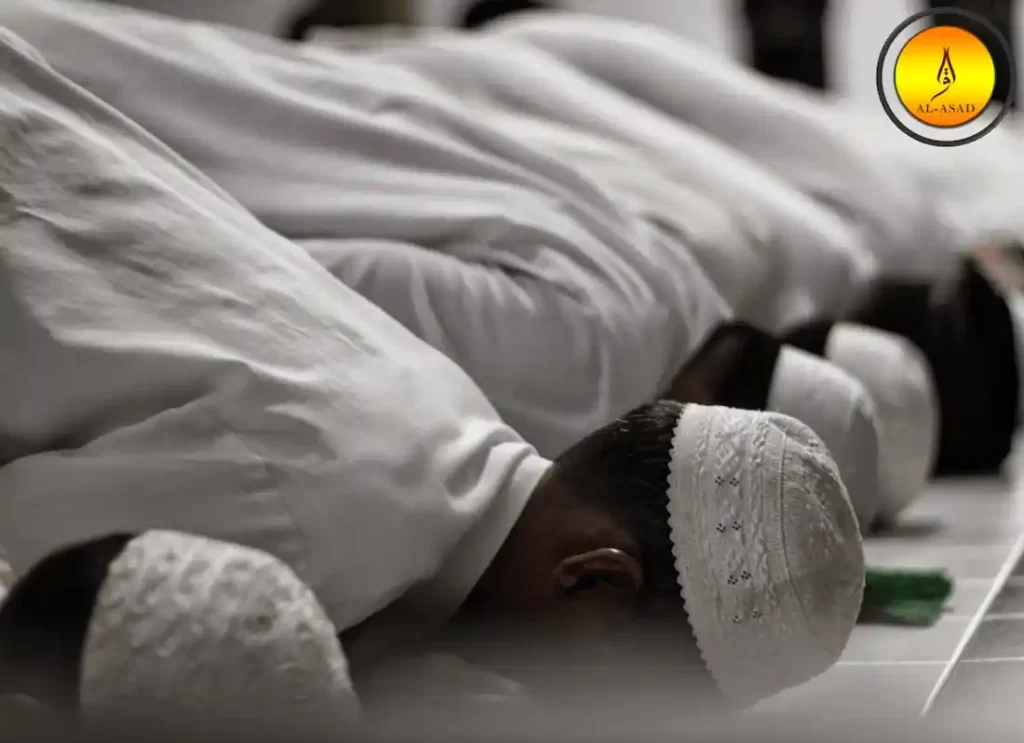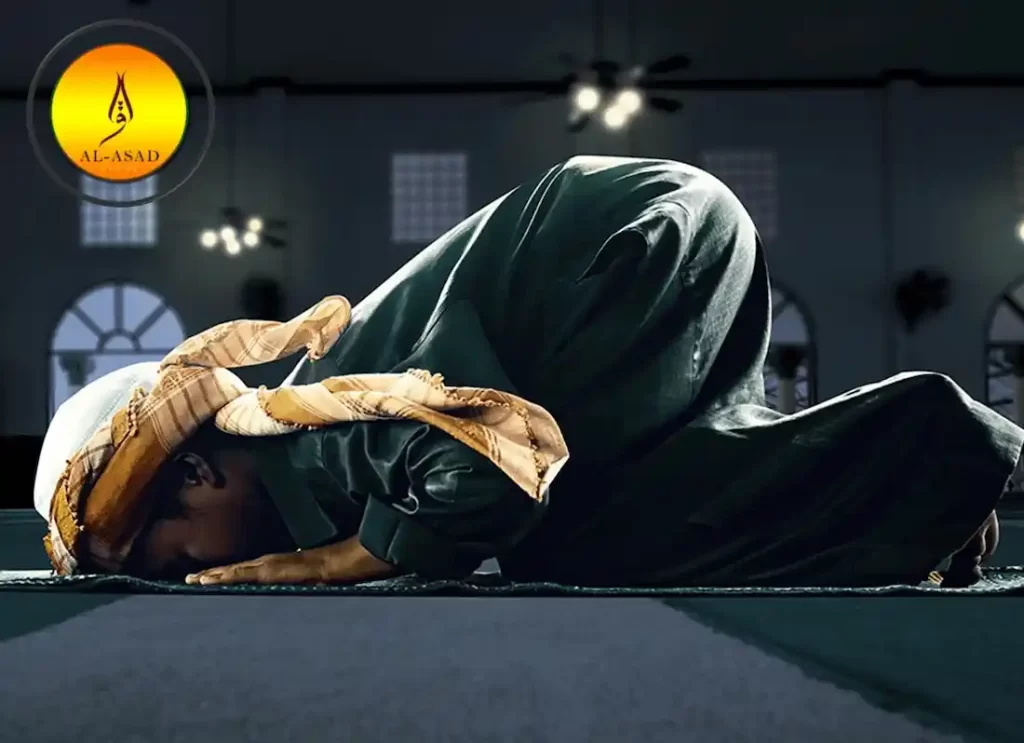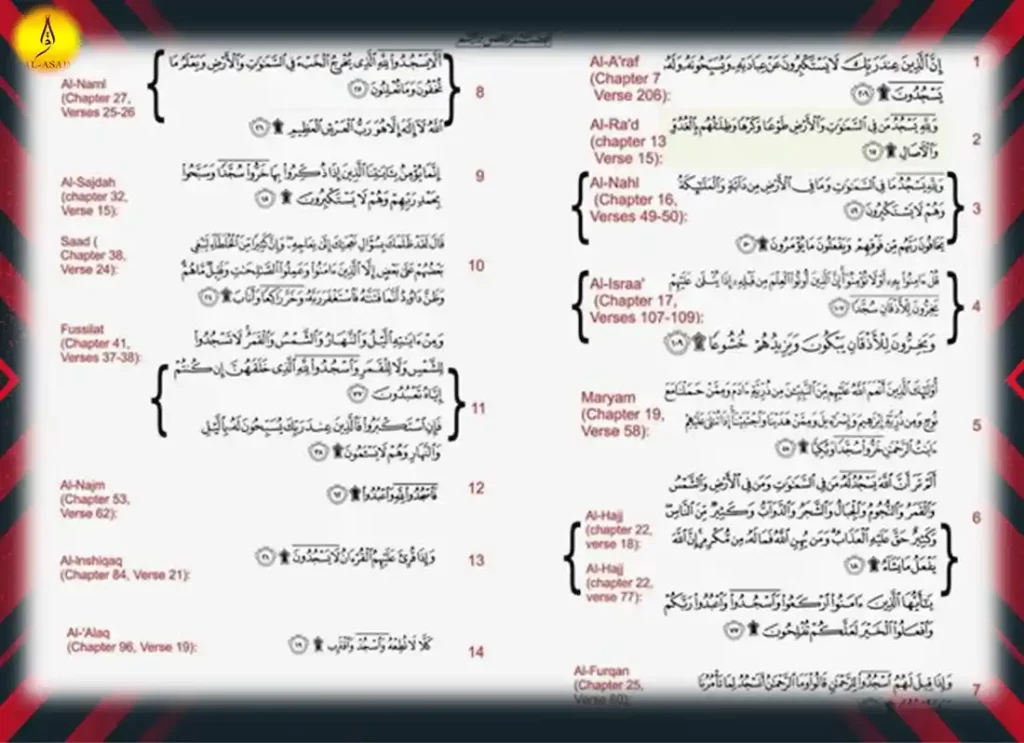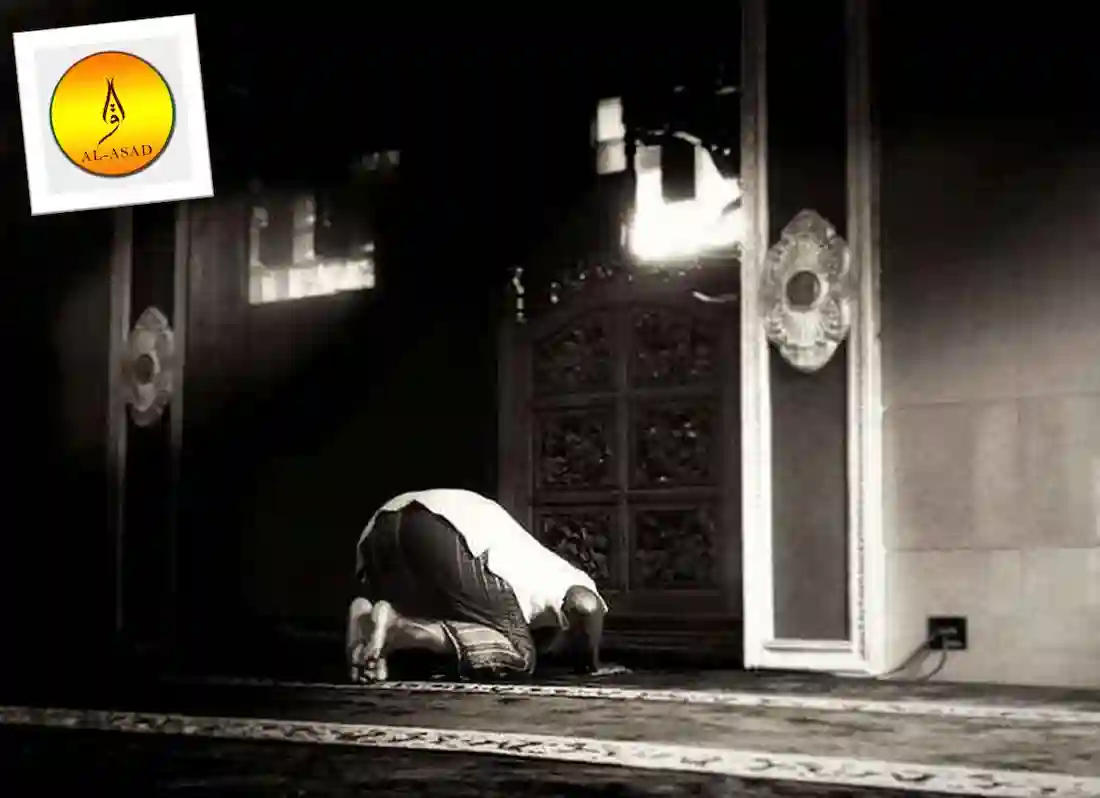Sujud in Quran – Islam stresses the belief in one God (ALLAH SWT), and that worshipping Him is only righteous. Worship (Ibadat) can be performed in many ways, but the most effective and closest way to achieve the concentration of ALLAH SWT (Sajdah) is to perform Sajdah (Prostration). It is a primary weapon against evil (Shaitaan).
Every Muslim in the world does different acts to fulfill their Islamic Faith. The importance of Sajdah e Tilawat can be illustrated in a Hadith. Prophet Muhammad (SAW), said that “Once a person prostrates after reading a verse requiring Sajdah, then the shaitan begins crying in a corner and saying: ‘Alas! The children of Adam were instructed to perform Sajdah and they did so, becoming entitled to enter Paradise. But I refused and was sentenced to Hell.” (Muslim, Ibn Majah).
Suggested Read : How Many Chapters in Quran? ,la ilaha illa anta subhanaka, Has The Quran Been Changed?, How Many Pages in Quran? , Allahumma Ajirni Minan Naar, Allahu Mahdina, Allahu Alam , Allah Yashfeek , Allah Subhanahu Wa Ta’ala

Sajdah & Sajdah Tilawat
Sujud in Quran – We will be explaining two concepts fundamentally, namely Sajdah Tilawat and Sajdah Tilawat. The Arabic term Sajdah, which is the first definition of the latter (Sajdah), refers to Adoration before ALLAH Almighty.
The latter (Sajdah Tilawat), refers to every time that the word ‘Al–Sajdah/Sajdah’ appears on the Quran’s side border while you are reciting it. Prostration becomes obligatory (Wajib). This Sajdah Tilawat is also known as Sajdah Tilawat.
Sujud Types
Sujud in Quran – These are all types of Sujud that are not performed during Salah.
Sajdah for Thankfulness
This comes from the sunnah (the Islamic prophet Muhammad) that whenever he heard news that would make him happy, Allah would give him sujud.
Sajdah for recitation/ Tilawah
When Muslims recite the Qur’an (tilawa), including congregational and individual prayers, there are 15 places that Muslims believe. Muhammad prostrated to God when he recited an ayah (verse) during recitation.
Sajdah for forgetfulness
During the ritual salat prayer, Sujud Sahwi (or Sajdah) of forgetfulness is observed. A person may forget to add or remove certain parts of salat (Qabli), depending on their situation. Either way, the Sujud Sahwi is used to correct the salat.
Verses of Adoration from the Quran
Sujud in Quran – There are fourteen Ayahs that seem to offer Sajda. Each Ayah is in a different Surah of Quran. Two of them can be found in the same Surah, i.e. Surah Al-Hajj. Remaining are in Surah Al A’Raf, Surah Al Ra’d, Surah Al Nahl, Surah Bani-Israil, Surah Al Maryam, Surah Al Furqan, Surah Naml, Surah As-Sajdah, Surah S’ad, Surah Ha Mim, Surah Sajdah, Surah Al Najam, and Surah Inshiqaq.
Suggested Read: Travel Dua, Morning and Evening Duas, Ghusl Dua , Entering House Dua and Dua For Wake Up

Sujud in Quran – Actually, there are 15 Sjadah Ayaat in the Holy Quran that Sajdah in 4 Ayaat is Obligatory(wajib) and it’s recommended(Mustahab) in 11 Ayaat.
Sajdah Wajib:
- Surah al Sajdah, Ayah 15,
- Surah Fussilat, Ayah 37,
- Surah an Najm, Ayah 62,
- Surah al Alaq, Ayah 19.
Sijdah Mustahab:
- Surah al A’raf, Ayah 206,
- Surah ar Ra’d, Ayah 15,
- Surah an Nahl, Ayah 49-50,
- Surah Bani Israeel, Ayah107-109 ,
- Surah Maryam, Ayah 58 ,
- Surah al Haj, Ayah 18,
- Surah al Haj, Ayah 77 ,
- Surah al Furghaan, Ayah 60 ,
- Surah an Naml, Ayah 25-26 ,
- Surah as Saad, Ayah 24 ,
- Surah al Inshiqaq, Ayah 21.

Below is a complete listing with surahs and related information.
| Sr. No. | Surah Name | Meaning Surah | Suran No. | Verse No. |
| 1 | Al A’raaf | The Heights | 7 | 206 |
| 2 | Ar Ra’d | Thunder | 13 | 15 |
| 3 | Al Nahl | The Bee | 16 | 50 |
| 4 | Bani-Israil | Night Journey | 17 | 109 |
| 5 | Al Mayam | Mary | 19 | 58 |
| 6 | Al Hajj | Pilgrimage | 22 | 18 |
| 7 | Al Hajj | Pilgrimage | 22 | 77 |
| 8 | Al Furqaan | The Criterion | 25 | 60 |
| 9 | Al Namal | The Ant | 27 | 26 |
| 10 | As Sajdah | The Prostration | 32 | 15 |
| 11 | S’ad | The letter Saad | 38 | 24 |
| 12 | Al Najm | The Star | 53 | 62 |
| 13 | Al Inshiqaaq | The Splitter Open | 84 | 21 |
| 14 | Al Alaq | Clod | 96 | 19 |
14 Verses (Ayahs) of Prostration
Sujud in Quran – Translation: Those who are close to the Lord do not worship Him: They praise Him and prostrate before Him.
Translation toAll beings on the earth and in heavens do bow before Allah (Acknowledging Subjection). They do this with good-will and in spite of their own selves: they do the same in the mornings and evenings.
Translation: The Command of Allah (Inevitable) comes (to pass). Do not try to accelerate it! Glory to Him and He is above the partners that they attribute unto Him.
Translation to They cry and fall on their faces, increasing their (earnest!) humility
Translation to When news of the birth of a female child is brought to one, his face turns dark and he feels buried with grief.
Translation: Do you not believe that Allah requires that all that is in the heavens, on earth, and in the sky, including the stars, the sun, moon, and trees, and the animals, and that we worship Him in worship? A great many are also fit for Punishment.
Translation of O you who believe! Do good, bow down and worship your Lord.
Translation to “Protege to (Allah), Most Gracious!” They say, “And (Allah), What is Most Gracious?” Shall we bow down to the commandments of thee? It increases their flight from the Truth.
Translation to Only believers in Our Signs can be lifted up in praise and prostration when the Scriptures are read aloud.
Translation: (David) said that he had undoubtedly wronged him in asking thy (single), ewe to join his (flock) of ewes. Truly many (in business) are partners who wrong one another: But not so are those who believe and do deeds for righteousness. And how few are they? “… and David realized that We had tested him. He asked for forgiveness from his Lord, fell to the ground, prostrated, and then turned to Allah in repentance.
Translation: The (Unbelievers), are arrogant. But those who worship the Lord by night and day are in His presence. They don’t flag, and they don’t feel above it.
Translation But fall in prostration to Allah and adore Him!
Translation to When the Qur’an is read, they do not fall prostrate.
Suggested Read: Dua Leaving House, Dua of Forgiveness, Dua of Taraweeh, Dua of Musa Alayhi’salam, Dua For Success, Dua For Marriage , Dua For Rain, Dua For Parents, Powerful Dua and Dua For The Sick

Questions and Answers
Is Prostration Obligatory?
When Sajdah is reading Quran, it is necessary to perform prostration. It is illustrated in the following Hadith:
Abu Huraira (R.A.) told us that Prophet Muhammad (SAW), said that when a person reaches the point of Sajdah, Tilawat, he prostrates then the evil (shaitaan), shouts and detaches from that person, howling, “O Disaster!” He did Sajdah when he was asked. Thus, Jannah has the gardens for him. However, when I was asked to do Sajdah I didn’t do it, and for me there is hellfire. (by Sahih Muslims)
How do you pinpoint Sajdah Tilat?
Prostrating can be identified by symbols or written words. This mark is usually used to refer to Sajdah. In typography, the word is often written lsjdh/sjdh. The following Images also show it.
How do you perform Sajdah
Now imagine that the point is at the place where Sajdah e Tilawat has become Wajib. Stand straight and say ALLAH o AKBAR. Then, bend down to ALLAH Almighty on your knees. Also, you should say subHana-rabiWya (Subhaana Rabbiyal–A’laa) at least three times. You can then say ALLAHU AKBAR and lift your head. Your Sajdah e Tilawat is now complete.
Is Sajdah e Tilawat required?
If a person is reading the Quran, or listening to it if the point comes to adoration, then Sajdah should be wajib upon that person. Sajdah Tilawat should be performed on any person who is sitting, lying down, traveling, or doing anything else.
Do you require wudu?
You do in all four Sunni schools. One Hanbali opinion says you don’t. A woman cannot recite the Quran while she is on her period . She must wait until her period is over to make the sujud.
Are you covered?
Yes. Like you would in salah.
Is it necessary to do taslim after?
No. No, you don’t need to add’salam!’ afterward.
Is it necessary to do it immediately?
You can do it later if you are unable to perform it immediately.
Is it possible to make up for lost sujud tilawah
You can do it in the Hanafi School. You can perform any time you missed sujud tilawah if you’re not able to do it.
These ayahs are so beautiful that we should prostrate to them.
Every verse in tilawah includes a commandment to perform sajda. It also mentions severe punishment for those who refuse. This is why believers rush to fulfill this command and show their obedience to Allah.
Is it possible for a follower to perform a sajdah while not reciting it aloud.
If a follower is already a member of the congregation, the Imam will perform the sajdah. A person who recites a verse that requires a sajdah but doesn’t utter it aloud, or writes it down, will not be required for the sajdah.

What should the Dua’ (supplication), be said in Sujudul-ul-Tilawah
The Dua’ to be said is the exact same as what was said during Salah in Sujud.
Can a woman who is pregnant perform the Sujud-ul-Tilawah, (Prostration of Recitation), and the Sujud-ul-Shukr, (Prostration of Thanksfulness to Allah)? If she cannot do it, can she praise Allah verbally by saying “Subhana Allah [Glory to Allah]”) during hearing Ayatul-Sujud (Qur’anic verses in Prostration strong>
First: A woman is allowed to recite Qur’an from memory but not from the Mus-haf (copy). She is also permitted to prostrate because it is not a Salah, but a way to show submissiveness and worship like Dhikr (Rememberance of Allah).
Secondly,A listener or reciter need not be in a state or Taharah to perform Sujud-ul-Tilawah/Sujud-ul-Shukr. They do not have the same ruling from Salah.
Sajdatut -Tilawah refers to a Sunnah
Question – If I find a Verse that requires me to prostrate while I recite the Quran at my desk or teach the students, or anywhere else, should I perform Sajdatut Tilawah? Is the prostration intended for both the reciter as well as the listener?
Answer – Sajdatut -Tilawah, a Sunnah for both the reciter as well as the listener, is not an obligation nor a prescribed practice for the listener unless the reciter is following the instructions.
If you are reciting a Verse that requires you to prostrate in your office or place of instruction, you can do so. It is also legal for students to perform the prostration with you because they are the listeners. If you don’t observe the prostration, it is okay.
CONCLUSION
Sujud in Quran – We have also described Sajdah e Tilawat. How to perform Sajdah e Tilawat, and who is Wajib. English translation has been provided for all Ayats that have Sajdah e Tilawat.









